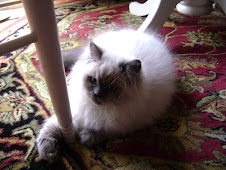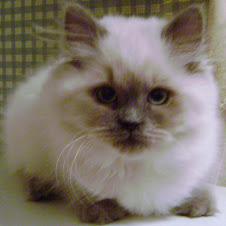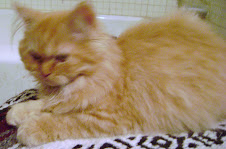There is an old proverb that most children probably learn to hate to the effect that 'Cleanliness is next to Godliness'. Cats, once worshipped as gods in more than one ancient culture certainly are devoted to Cleanliness far more than humans ever have been even in their 'wild' state.
Cats are not entirely content if they are not clean. Furthermore, they prefer a clean environment. That is why a cat can be trained quite easily usually to use a litter box. Even cats who are not 'litter-trained' will attempt often to cover their messes. Some may argue that this is not so much an example of cleanliness as it is concealment of the cat's presence from potential enemies. The habit of covering any mess is only one example of a cat's fastidious nature.
Contrary to popular belief, cats actually love to be bathed once they have learned to accept water as a familiar medium. If they trust the person who is giving the bath and are familiar with the sensation of being bathed, they actually can learn to enjoy the ritual. They definitely like the result.
When a cat 'scratches' a post or any wooden object, the cat does not sharpen his/her nails as much as he/she grooms the nails by performing this action. Dead nail is removed when a cat scratches a post. Cats need nail grooming and again, once a cat is familiar with the process and learns to trust the implement, a cat will be happy to have his/her nails clipped by an owner. The best way to do this, in my experience is by massaging the cat's paws. Rub the centre of the ball of the paw and a cat will stretch contentedly, responding positively to the massage. Once a cat becomes familiar with this ritual, the clippers can be introduced and you will find it is not that difficult to clip the nails. As when clipping the nails of a child, however, one must be alert and careful not to cut the nail to the quick.
More essential than bathing or nail grooming, however is the ritual of combing. A healthy, contented cat will spend hours washing himself/herself and any feline companions. When a cat owner combs a cat, he/she is entering into the cat community in a ritual that is an essential part of a cat's life.
A cat will groom another cat's fur as an act of friendship and love. When an owner combs a cat, this is recognised more as an act of love than any verbal dialogue ever would be.
Even short-haired cats appreciate combing, but for a long-haired cat, it is absolutely essential. Cats may be skittish at first at the touch of the comb, but they quickly learn to enjoy the ritual and it is a far more effective way of removing dead fur and stimulating the scalp than any other. When an owner combs his/her cat regularly, the cat will not swallow hairballs as all the dead fur will have been removed previously by the comb.
Some cat owners are reduced to the measure of taking a cat to a veterinarian to be shaved once or twice each year after the cat's fur becomes so matted as to be intolerable. This should not be necessary in the case of even a cat with extremely long hair. Combing the cat twice weekly would prevent fur from becoming matted and both owner and cat would benefit from the ritual.
The cat may benefit physically from regular combing, but the owner can benefit emotionally and spiritually. Brushing or combing hair is an ancient rite of magic. The rhythm of the brush or comb is conducive to meditation and alters breathing patterns and spiritual focus. It reduces stress and forces the individual to detach himself/herself from all other aspects of life. When this ritual is conducted with a beloved pet, it benefits both the animal and the owner. Moreover, it is an act of bonding and the animal will respond accordingly.
Adult cats who never have been combed can learn to enjoy it as much as a cat who has been combed from infancy. I have been able to persuade feral cats to accept a combing and to learn to relax with the comb. I actually prefer a 'flea comb' to other brushes and combs because it has very fine teeth and can be used to undo the worst 'knots' in a cat's pelt. When I find a knot, I then use the corner of the comb to tease it out gently and slowly. It is very effective.
Initially, I had intended to write only about the sense of peace that descends upon me whenever I comb a cat, but when I realised how many cat owners and cat lovers never have combed their cats, I decided to write about combing and grooming in general.
I have had more than one cat who has reciprocated. I find it quite charming when a cat decides to groom me. To me, that is the final proof that, to a cat, grooming is an act of love and acceptance and one that is an essential part of his/her existence.
I do not believe that human beings necessarily are superior to other forms of life. Although we may be more technologically advanced in certain areas, in other areas we can learn from animals as much as our ancestors did. The argument that animals act only according to instinct is as fallacious as any contention that human acts are governed solely by instinct. On the other hand, the instinctive behaviour patterns of our animals can be applied to our own lives to improve both our understanding of our pets and our own spiritual standard of living.
As far as I am concerned, it is obvious that cats are superior to us in their ability to relax. A cat can immerse himself or herself wholly in the act of contemplation or meditation yet still be alert for danger on another fundamental level. Contemporary society is fast-paced and many people find it difficult to relax. In fact, the inability to relax is at the heart of many psychological and physical disorders. The simple ritual of combing a pet can provide a key to relaxation. In ancient societies, individuals actually would study animal behaviour as a spiritual exercise. Although our urbanised life makes it difficult for us to interact with many animals firsthand, household pets still provide a link with the animal kingdom that should not be underestimated or ignored.
Feeding a pet is only one aspect of care and attention. As when raising a child, it is not sufficient simply to provide shelter and physical sustenance. In the role of parent, owner or caretaker, one can receive knowledge and love as well as give it. The joys of having a pet, as much as the joys of having a child, far outweigh the burdens.
Subscribe to:
Post Comments (Atom)




No comments:
Post a Comment